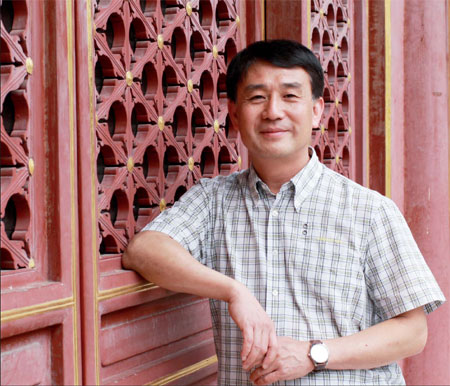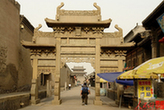Drawing on his roots in China and experience of living in Germany, composer Chen Xiaoyong has forged his own cross-cultural style.

Chen Xiaoyong says he wants to find a unique music language, "one that is both Chinese and relatable to all human." Li Yanwen / for China Daily
As the concert drew to an end, Chen Xiaoyong sighed with relief. An acclaimed composer based in Germany, his expectations back home in Beijing are unreasonably low. "I'm really delighted to have seen the audience make it to the end," he says.
For two-and-a-half hours, the concert presented seven symphonies composed by Chen and young Chinese composers tutored by him. The Chinese influence in the music is tangible, yet not as flamboyant as the Chinese audience is used to. While some enjoyed it, many looked confused.
But that's exactly why Chen is here. Drawing on his experience in the West and the East, he is helping nurture a new generation of Chinese musicians, educators and audiences. And he is fully aware of the immensity of the task, given that the Western classical music scene in China is in its infancy.
"We are not intending to make classics through just one concert. This is a chance for us to meet the audience, for them to raise questions and build an environment that will allow the music to grow," Chen says.
Known for creating music that fuses together Western and Eastern sounds, the Bach Prize winner has been commissioned to create work by prestigious organizations including Southwest German Radio Symphony Orchestra, Asian Culture Link Vienna and the NDR Symphony Orchestra. In 2000, Chen was invited by cellist Yo-Yo Ma to create a piece called Fusion for Ma's Silk Road Project. In 2010, he was appointed as guest professor of composition at the Academy of Music and Theater in Hamburg.
Chen has always tried to stay connected with his home country. He has been serving as professor for composition at the Shanghai Conservatory of Music since 2006 and has returned to China five times in the last three months to help organize his recent concert, part of a project to train teachers for the Attached Middle School of China Conservatory. Chen serves as the leading tutor of the project.
He is also involved in designing the music curriculum for Chinese schools, in a bid to improve the teaching quality of elementary music education that has been eroded by the pressure put on students to pass exams.
"The key for the development of music in China is the basic education," he says. "We have to cope with the mounting pressure of getting into universities, but we also have to see what we are living for. If the kids are not educated properly, how can we hope for the future of China's music?"
Of the significance of education, few know better than Chen. Born in 1955, he was among the first generation after the "cultural revolution" (1966-76) to receive a proper university education.
He studied composition at the Central Conservatory of Music in Beijing before moving to Germany to study at the Music Academy of Hamburg in 1985. There he was taught by Gyorgy Ligeti, a prominent composer.





Why not rent a boyfriend, or girlfriend to please parents during the Spring Festival?